I had visited this farm numerous times over the years to get Christmas trees and pumpkins. Because it is the largest and most well known farm in our area that sells both seasonal items, this was the go-to farm for both of my kids’ school field trips over the years. I had never really gotten to know the owners though, so I enjoyed meeting them both and finding out how the got their start. I was super pleased that the editor used my photo for the cover along with a few others that I took inside.
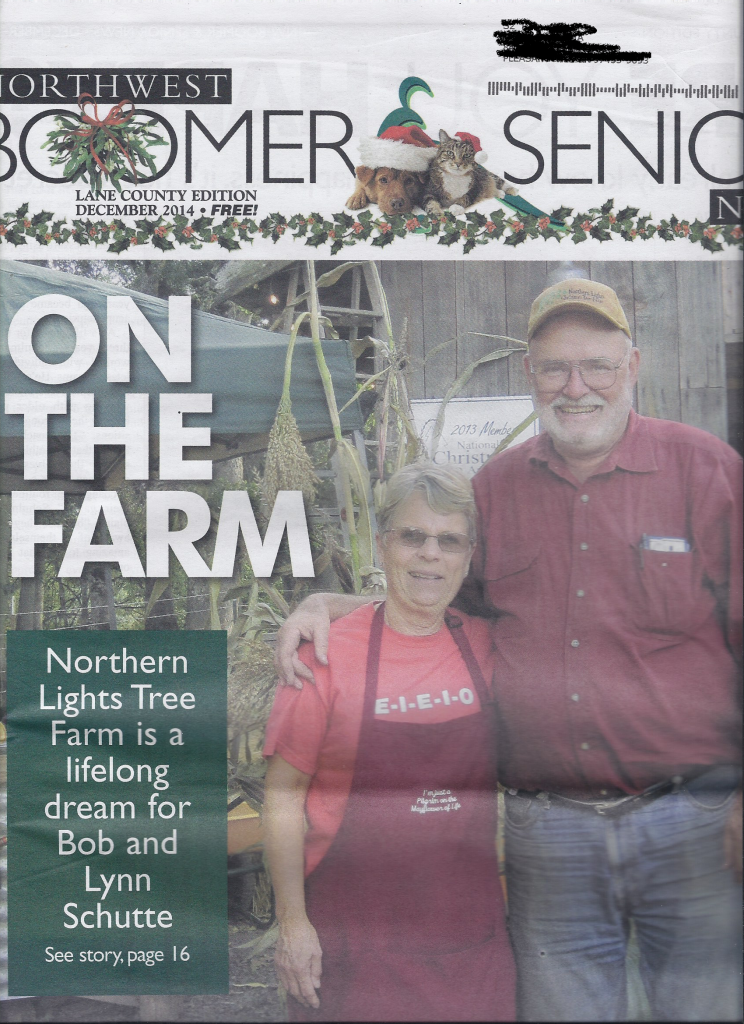
Photo by Vanessa Salvia
Northern Lights Are Shining
Pleasant Hill farm is a year-round attraction
By Vanessa Salvia
The Northern Lights Christmas Tree Farm may have Christmas Tree in their name, but they offer a lot more than just trees. The truth is, they did start off as a Christmas tree farm, but added many other products and attractions over the years. And, “Northern Lights Christmas Tree Pumpkin Patch Grass-Finished Beef Pasture-Raised Turkeys Chickens and Ducks Goats Pigs Corn and Hay Farm” was too long to fit in their website address.
The owners of Northern Lights, Bob and Lynn Schutte, didn’t start their lives as farmers, though it was Lynne’s ultimate goal. The pair, who both turned 70 this year, met their first day of high school chemistry class in San Jose, California, when they were juniors. “We were lab partners,” says Bob. “The chemistry was great,” Lynn says with a laugh, reaching out to give him a hug.
Though the farm started out small, they now host hundreds of people daily during the peak pumpkin and tree season. On a sunny, warm Friday in October, Lynn estimated that 400 people would visit that day alone. “On a weekend, we probably see about as much maybe more,” she says. “It depends on the weather. If it rains this Saturday you can bet attendance will be down.”
Today, the farm has 70 acres planted in 5 different trees: noble firs, grand firs, Douglas firs, Nordmann firs and Fraser firs. Three acres are in pumpkins, 2 in corn and 30 in hay. They raise goats and pigs (cared for by the Biancalana family in Springfield), about 120 cows and dozens of turkeys, chickens (for eggs and for roasting) and ducks (for pets).
One of Bob’s most visible jobs on the farm is driving the tractor. “OK, everybody ready for the ride?” he says, in his big booming voice. Thousands of kids know him as “Farmer Bob,” and he looks and acts the part, with his jeans, ball cap, round face and neatly trimmed white beard.
He gives each trailer load a glimpse of the farm, driving them past the tree fields and talking about how long it takes to grow one to the point that it can be harvested. He talks about the Daletus family, a local family that uses space at the farm to grow pumpkins for the competitive circuit. One of the Daletus pumpkins broke the world record for size in 2003, tipping the scales at 1,385 pounds. Bob shows his guests the flock of turkeys, and reminds parents that the turkets can visit anyone’s home for Thanksgiving if they get their order in soon enough. He takes them by their log home, where they host weddings, and tells the kids to look across the water to the uninhabited island, where “nothing lives but wildlife.” “Keep your eyes open kids,” Bob says. “You might see a deer.”
At each stop along the way he takes time to answer questions, some silly, some serious, from both parents and kids alike, before finally depositing them in their field of choice, promising to return for them after they’ve had time to find the very best pumpkin or tree in the field. While Bob is fulfilling his farm duties, Lynn is most often at the retail store, where visitors pay for their tractor rides, hot chocolate and trinkets.
During high school, Bob and Lynn dated, then both went off to begin their post-high-school lives. Both were in college for a year or so. Bob took a motorcycle trip to Mexico, while Lynn joined the Peace Corps and served in Brazil. “After we got out of both of our hitches we rediscovered each other,” Lynn says.
Bob was drafted into the Army in 1965. They married in 1966, and made their first home together in DeRidder, Louisiana, while Bob was stationed at nearby Fort Polk.
“Then we came back to San Jose and we were both enrolled in school again,” says Bob. “Lynn became an elementary school teacher and I became a mechanical engineer. I had my first engineering job in the Bay Area.”
After that, the couple moved to Washington State, where they lived and worked for 10 years. Then they moved to Alaska in 1981. While there, Lynn continued her work as a teacher and Bob worked on the oil fields of Alaska’s North Slope.
While in Alaska, they often traveled to the Eugene area to visit Bob’s brother, who lived in Pleasant Hill. They began looking for a small farm to relocate to. Bob’s brother used to live right next door to the farm that is now Northern Lights, and told the couple about the farm when it came on the market.
“We were looking for 10 or 15 acres and we got 162,” says Bob. “When we saw this place we fell in love with it. It was a decision of the heart, nothing practical about it at all.”
They purchased the farm in 1986. At that point Bob’s nephew was caretaker of the farm and planted their first batch of Christmas trees. Lynn was able to take early retirement from the Alaska school system, and they moved here full-time in 1994. That year, they had their first Christmas tree harvest.
Their first year on the farm they lived in the milk house, which is a concrete block building attached to a large barn. “It was the old milking parlor,” says Lynn. “This used to be a dairy in the 1940s. All I know about the owners is that they were childless. The husband had died previously so when the wife passed away there were no immediate heirs so the estate went to the cousins and one of the shirttail relatives became executor of the estate and put it on the market. We came and looked at it and we fell in love with it.”
After moving to the farm, they began building their large log home, which now sits on a beautiful site adjacent to a channel of the Willamette River. Lynn continued substitute teaching while they got their new home established, although farming was what she really had her sights set on.
“Being a farmer was always my ultimate goal,” says Lynn. “And when I did do the substitute teaching it was simply because we hadn’t developed the farm activities to the point where I had to be here like I am now. As the farm activities grew I decided I wasn’t going to do that anymore.”
The Schuttes started out wanting a little bit of elbow room, and they got that plus more. “When we fell in love with this place we had to revamp all of our plans. We had to ask ourselves, ‘What are we going to do if we buy this place?’ The only way we could make it work was to have a working farm, a farm that produced income, because we were a working family. So that’s what we’ve done. It’s grown and developed into activities beyond our means. We’re busy 11 months out of the year here.”
Lynn says that in order to make it financially they had to be inventive. “I think the days of traditional farming for especially a small farm like ours is over,” she says. “You have to have some kind of a little gimmick or something that’s going to help you pay the bills. We just don’t have the volume so we have to look at being innovative.”
Each year they wholesale about 2,000 Christmas trees, shipping them to retailers around Oregon, from Alaska to California and sometimes as far east as Missouri. And their choose-and-cut operation “has exploded” in popularity Lynn says. October is field trip season, with numerous area schools scheduling pumpkin patch visits. During October, they set up a replica of the Mayflower, made out of hay bales, that kids can climb on and around.
Their beef is grass-finished, which is important, says Lynn. “Lots of producers can say that their beef is grass-fed but then they do the last 6 to 8 weeks graining the cows,” she explains, meaning the cows are fed grain rather than grass in the weeks before they are butchered. “That’s what adds the fat that we love so much but it’s also the bad fat, the fat that’s not good for you. We keep them just eating grass.” They now offer milk veal, which is milk-fed, pasture-fed veal. “None of that keeping the cows in crates stuff,” she says. “They’re just with their mamas.”
The Schuttes attend the Ebbert Memorial Methodist Church in Springfield. The farm either opens late on Sundays so they can go to church, or they have someone else come and open the retail stand for them. The couple has a son and daughter-in-law and a 10-year-old grandson, Andrew, who live in Springfield. Their youngest son still lives in Alaska, with two daughters, aged 11 and 13.
Throughout these busy years, Bob continued working as a facilities engineer in Alaska. That meant flying to the North Slope for two weeks and being home for two weeks, from February through September each year. “He just retired,” says Lynn. “That’s what he was doing up until just a couple of months ago. We just threw a huge retirement party for him, so he’s done.” At least, the going back and forth on a regular basis is done. But for someone who loves their career, it’s hard to give it up completely. “I would be a bit surprised if the occasional project comes up and he’ll do it either from home or take a short jaunt up,” says Lynn.
And given Bob’s engineering background, he’s incredibly handy to have around. “Things break and he’s there fixing it,” says Lynn. “I recommend everybody marry a mechanical engineer! They’re very handy, that’s for sure.”
Despite her lightheartedness, it’s not easy work. “Most of the time we managed with great difficulty,” says Bob. “Because both of us are people who like to have things complete and done, you know, your workload under control and all that. What we found here was that wasn’t our way of life anymore because our work was never done. The psychological stance that I took was, ‘I’m just going to do the best that I can.’ I can always do more and sometimes things don’t happen at just the right time but I’m going to do the best that I can and that’s what we do. And, we’ve had some good help along the way.” Lynn concurs. “We have great help and we certainly couldn’t do it without them.”
Does she work longer hours as a farmer or as a teacher? “I don’t know,” she says, thoughtfully. “I put in long hours as a teacher. But it’s what we want to do and what we can still do.” She estimates that she works 15 hours a day. “There’s so many aspects of it—there’s the bookkeeping, the data entry, the shopping for supplies, there’s the marketing piece, there’s the getting ready to go to a market, there’s the going to the market, there’s preparing for these kind of events and field trips. We do weddings so there’s the gardening, there’s the house cleaning, and you have to eat so there’s cooking. It’s all the chores of daily living that you do plus taking care of the animals. Oh yeah, it’s a very busy life.”
They are both 70, but hardly look it, although they feel it sometimes. After creating it about 15 years ago, Bob recently quit launching pumpkins from his homemade trebuchet, a type of catapult that relies on the use of a large counterweight to give it momentum. “He decided, and rightfully so,” says Lynn, “that wasn’t something he was going to feel comfortable doing because it requires a tremendous physical exertion to pull it down and because of the liability he didn’t want anyone else doing it.”
Bob returns from his last tractor ride of the day and hears Lynn talking about the different decisions they’ve had to make since turning 70. “I’m not 70!” Bob protests. “Yes you are,” says Lynn. “I spilled the beans.” “It is getting harder and harder to get beneath the tractor,” says Bob. “And with my gardening,” says Lynn, “I wonder, ‘Why do the weeds have to be so close to the ground?’”
Now that they’re 70, Lynn says, they have started looking to what they might do when they can’t farm anymore. They haven’t figured that out yet. “I hope we can be open to making the right decisions,” she says. “In that regard we’re just like a lot of other boomers and seniors. We’re facing those decisions that come with aging and having a career and when do you decide, ‘Well, I’ve had enough of that?’ Hopefully we’ll know when either physically we’re no longer able to do it as well or all of a sudden financially it doesn’t make sense anymore.”
For now though, things are continuing. The hay for next year is ready to sprout, the baby pigs and baby cows are growing up, and next year’s pumpkin patch is getting tilled. Northern Lights Christmas Tree Farm has managed for another year.
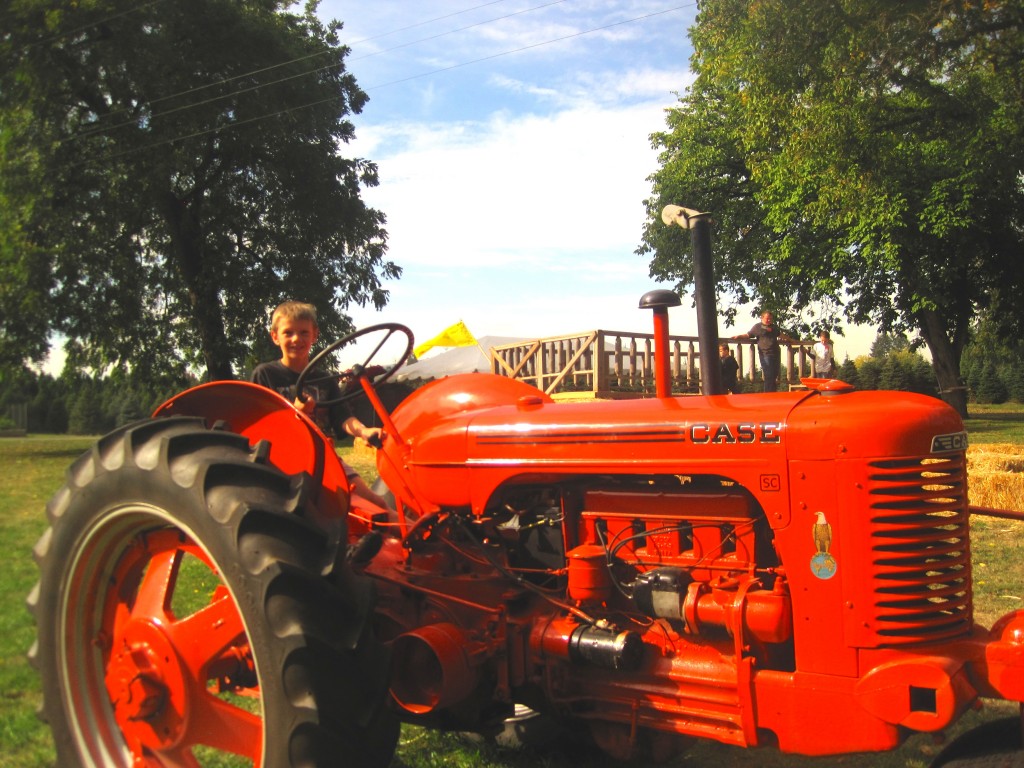
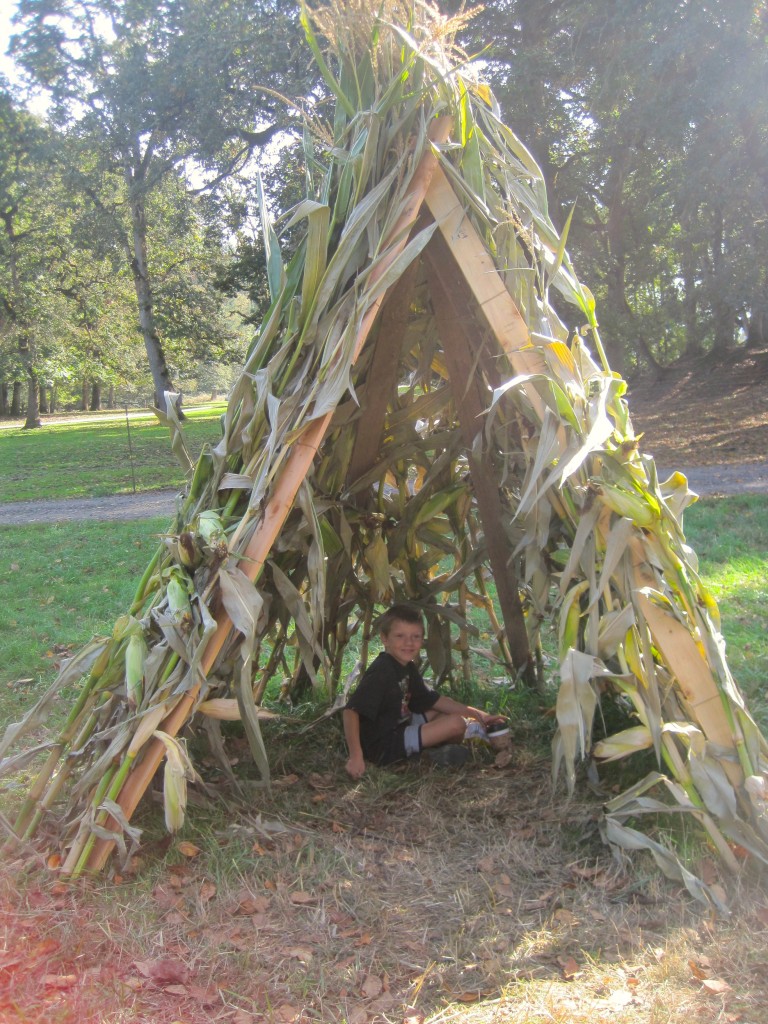
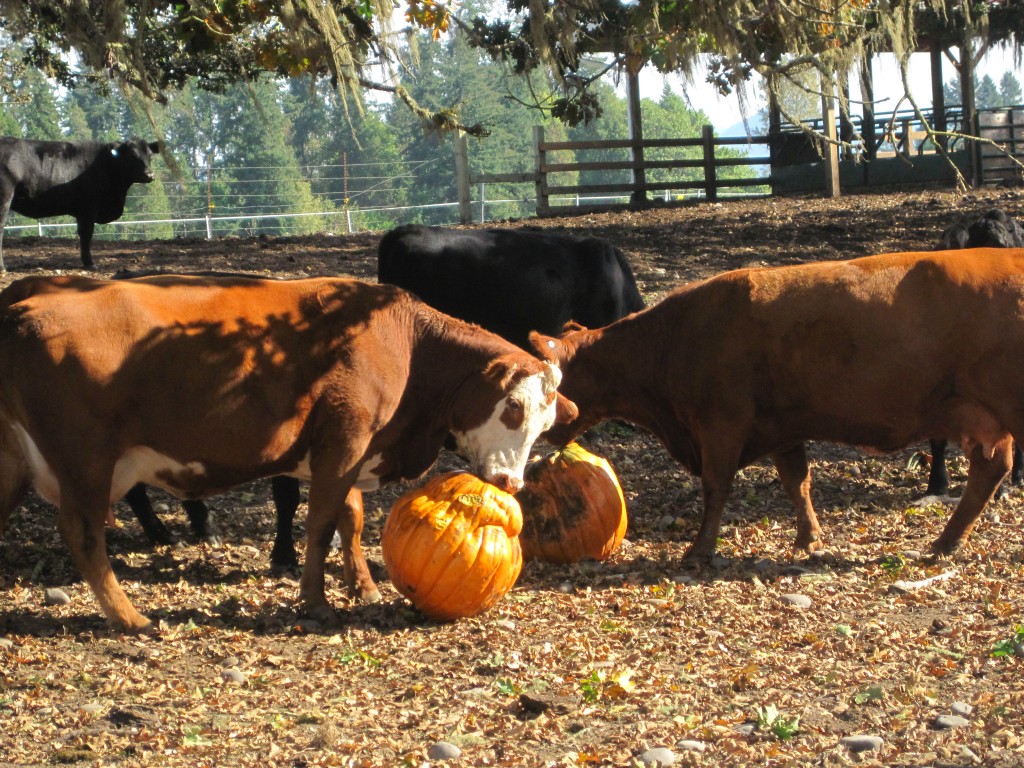
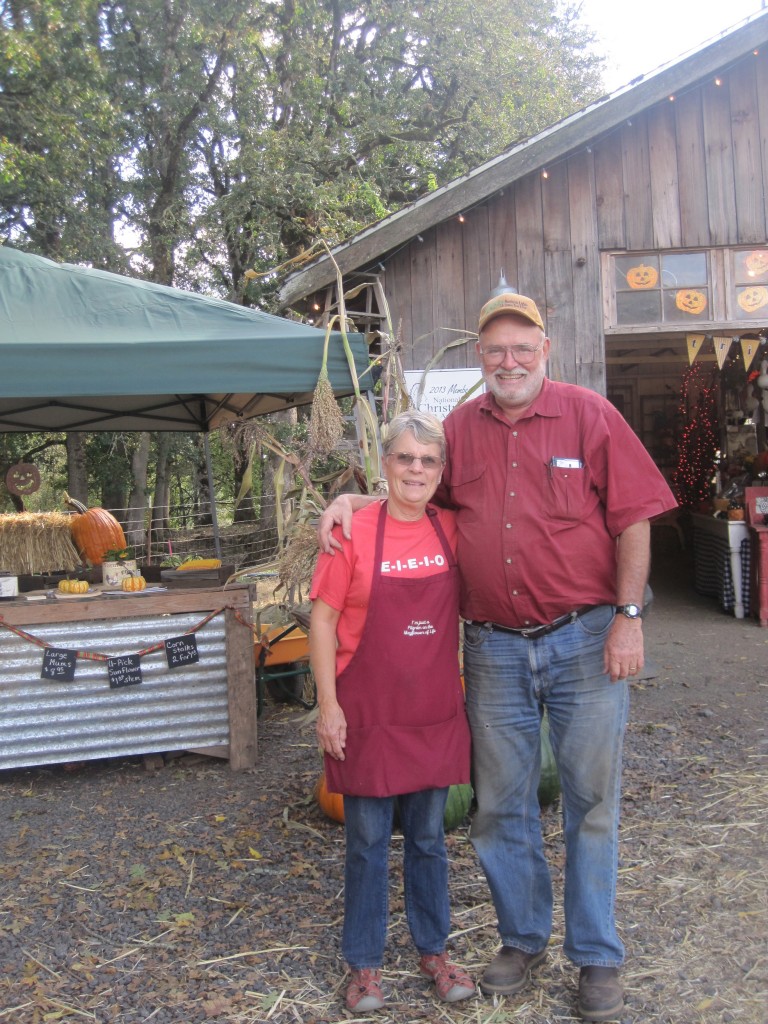
No comments yet.